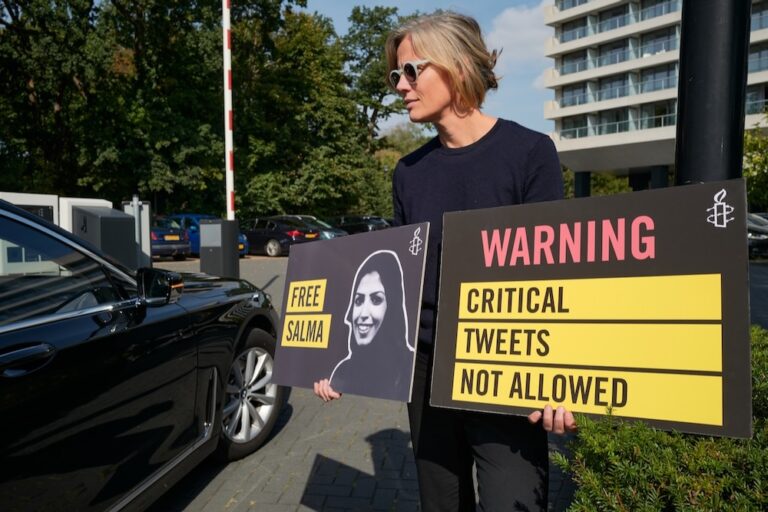Khashoggi's murder has become emblematic of a global pattern of impunity for crimes against journalists and the alarming rise of transnational repression.
This statement was originally published on ipi.media on 2 October 2024.
IPI demands accountability on anniversary of brutal murder
Six years have passed since the brutal murder of Washington Post columnist Jamal Khashoggi, a Saudi national and vocal critic of the Saudi regime. The IPI global network strongly condemns the continued lack of accountability for his heinous murder, and reiterates its call for an independent, impartial criminal investigation into the role that high-level Saudi officials, including Crown Prince Mohammed bin Salman, played in his killing. We strongly urge the international community to prioritize this case and to push for full justice for Jamal Khashoggi.
On October 2, 2018, Khashoggi entered the Saudi consulate in Istanbul to collect a document needed for his upcoming marriage. He was killed inside the consulate by a team of 15 Saudi agents and his body was dismembered by a bone saw. To date, his remains have not been found.
Investigations have found that the Saudi regime planned and perpetrated Khashoggi’s murder. A 2019 investigation by UN Special Rapporteur Agnes Calmard concluded that Khashoggi’s murder was the result of extensive planning and coordination by high-level Saudi officials, and required significant human and financial resources. An investigation by U.S, national security agencies also found that the crown prince had most likely approved the “capture or kill” operation. That assessment was based on the prince’s control in decision making, which makes it highly unlikely that officials would have carried out such an operation without authorization. The team involved in the murder also included seven members of bin Salman’s elite personal protective detail.
Sham verdict
In response to international outrage and attention, Saudi Arabia carried out an investigation into Khashoggi’s killing. It later put 11 unnamed individuals on trial at the Riyadh Criminal Court. By September 2020, the court sentenced five of them to death and three others to prison terms ranging from seven to ten years. The death sentences were later reduced to 20-year prison terms. The verdict was widely regarded as a sham, allowing the high-level officials who ordered the execution to go unpunished.
Khashoggi’s murder has become emblematic of a global pattern of impunity for crimes against journalists globally, as well as an example of increasing transnational repression by states seeking to stifle dissent or criticism by carrying out targeted attacks, harassment, or killings of journalists even beyond their own borders.
It has also stood out as a troubling example of the consistent failure by the international community to hold states accountable to their obligations to ensure journalists’ safety and carry out independent, thorough investigations when attacks against the press occur, in accordance with international human rights law.
Failure to hold kingdom accountable
Governments, including allies of Saudi Arabia, have failed to take any concrete measures to ensure those responsible for Khashoggi’s murder are brought to justice. Turkish President Recep Tayyip Erdoğan initially vowed in 2018 to hold those responsible for Khashoggi’s murder accountable, but in 2022 Turkish authorities transferred the trial of 26 suspects to Saudi Arabia, all but ensuring that those involved would continue to evade culpability.
The U.S. government initially seemed poised to push for accountability but has since backpedaled. In late 2018, the U.S. Senate passed a resolution blaming the crown prince for Khashoggi’s killing, a strong rebuke of then-President Trump’s controversial comments in which he refused to implicate Mohammed bin Salman for Khashoggi’s murder.
In 2021, the Biden administration announced sanctions and visa bans targeting Saudi Arabian citizens over the killing, but did not sanction the crown prince himself. In a highly disappointing move, the U.S. state department in 2022 determined that the crown prince had immunity from a lawsuit filed by Khashoggi’s fiancée and a non-profit organization against the crown prince.
“It’s truly appalling that six years after the murder of Jamal Khasshogi, there has yet to be any real accountability for this crime”, Amy Brouillette, Director of Advocacy for IPI, said. “It is equally troubling that states around the world, including the U.S., have also failed to ensure justice for Khashoggi’s murder, which has allowed those responsible to carry out this heinous crime with impunity. Khashoggi’s case is a stark reminder of the extreme dangers that so many journalists around the world face, and what some states will do to silence critical voices – even outside their own borders.”



